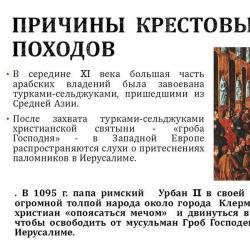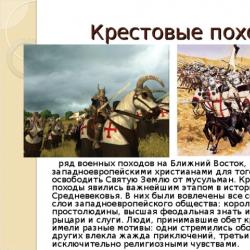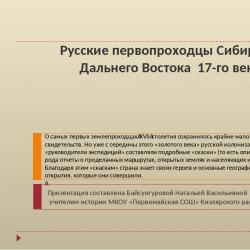Barbarians. The meaning of the word barbarians in the directory of characters and cult objects of Greek mythology The term in the modern world
Barbarians
(Greek barbaros - foreigner)
among the Greeks and Romans, the name of foreigners, as an onomatopoeia of an incomprehensible foreign language (barbar). The philosopher Plato used this term in relation to the Greeks in the sense of "an uncultured, uneducated person." However, throughout antiquity, the main content of the term was to oppose the backward tribes and nationalities - the "cultural" Greeks (and later the Romans).
Poplinskiy Yu.K. On the concept of "barbarian" in antiquity // African ethnographic collection. L., 1982. Issue. 13. S. 161-185.
(I.A. Lisovy, K.A. Revyako. The ancient world in terms, names ...
Barbarians (Greek bárbaroi, Latin barbari)
an onomatopoeic word that the ancient Greeks, and then the Romans, called all foreigners who spoke a language they did not understand and were alien to their culture. At the beginning of N. e. name "V." were especially often applied to the Germans (See Germans) (in modern times, in the historical science, the invasions of the Germanic and other tribes in the first centuries A.D. were called barbarian conquests; the kingdoms they founded on the territory of the Roman Empire were barbarian kingdoms; a record of the usual the rights of the Germanic tribes - Barbarian truths). The barbarian conquests played a major role in the destruction of the slave system and in the formation of feudal relations on the territory of the Roman Empire (see also the Great Migration of Nations, Feudalism).
(Greek Bapbaroi - not Greeks, foreigners; lat. barbari) - onomatopoeic. a word, to which the ancient Greeks, and then the Romans, called all strangers as people speaking an incomprehensible language. and alien to the "real" Hellenic culture. At the beginning of our era, the name "V." especially often applied to the Germans. From the Romans, this word passed to other peoples of Europe. In modern times, the term "V." was transferred to the East. science to designate the totality of peoples who invaded the limits of Rome. empire (barbarian conquests) and founded on its territory. a number of independent. kingdoms (barbarian kingdoms); records of customary law of these peoples are known under the name. barbaric truths. The barbarian conquests played a big role in the destruction of the slave-owners. building and in the formation of new, feudal. relations on the territory Rome. empires (see the articles Feudalism, the Great Migration of Nations, as well as articles on individual barbarian tribes and states (Burgundians, Visigoths, Ostrogoths, Vandals, Lombards, Franks, the Frankish state, etc.)).
...BARBARS
βάρβαροι. This name originally referred only to the language and meant a foreign-speaking person; so, karians, Il. 2, 867, are called βαρβαρόφωνοι. The Egyptians also called all those who spoke a foreign language V. ( hdt. 2, 158). It is clear that an expression of some contempt was easily combined with this name. This antithesis of the New Barbarians was especially revealed during the more original development of the national spirit and the higher self-consciousness of the Hellenes in comparison with other peoples, and especially the inhabitants of the East. By nature itself, the Greek was appointed to dominate V. Arist. Polib. 1,2. Eur. Iph. Aul. 1379); cf. also 7, 6, where he ascribed...
(Barbari, Βάρβαροι). In ancient times, this name denoted people who spoke a foreign language, and this name was associated with some contempt for foreign-speaking peoples. The Greeks considered themselves superior to the barbarians, and little by little the word barbarian came to signify less development and a lower degree of culture. During the time of Roman domination, all those who were not involved in the Greco-Roman civilization were called barbarians.(Source: "A Brief Dictionary of Mythology and Antiquities." M. Korsh. St. Petersburg, edition of A. S. Suvorin, 1894.)
(Rom.1:14, Col.3:11) - the signified word originally meant all earthly peoples, except for the Greeks. As a result of this, the population of the entire globe was divided into Greeks and barbarians. Therefore, the word: barbarian means a stranger who does not speak the language of a native country. In the book of Acts (282), in the epistle to the Romans (Rom. 1:14) and to the Colossians (Col. 3:11), the word barbarian means a person who did not belong to either the Jews or the Greeks.
Barbarians
Int. V. Greek names. will present. all other tribes and peoples, the language of which was incomprehensible to them and seemed discordant. (incomprehensibly chatting). Hence the disdain. designation rude and uncultured. person. Even the Romans themselves called. sometimes V. (eg, Plautus) himself, while the Greek. lang. and culture are not deeply rooted in Italian. environment. In Hellenes. times V. names. peoples, to-rye were outside the influence of Greco-Roman. culture or were at a lower level of culture. development (for example, the Germans). Antich. the concept of V. borrowings. in Christ. Byzantium and Western Europe, where it acquired "godless". In Byzantium, V. is called, in addition, Western European, as well as other Christs. peoples.
Ancient world. Encyclopedic...
Barbarians (Greek barbara). Int. "barbarians" the Greeks called representatives of all other tribes and peoples, the language of which was incomprehensible to them and seemed dissonant. Later, the concept of a lower level of education and culture became associated with this word. But for Paul, who was called to fulfill God's commission, there was no difference between Greeks and barbarians: he was sent to all people (Rom. 1:14). Everyone is equal before God and in the Church; "There is neither Jew nor Gentile; there is neither slave nor free; there is neither male nor female" (Gal 3:28; see also Col 3:11). In Acts 28:2,4 the hospitable Maltese are called barbara, which is in the Synod. per. Referred to as "foreigners".
The name of all foreigners among the ancient Greeks and Romans. In a figurative sense - rude, ill-mannered, cruel people.
BARBARS, among the ancient Greeks and Romans, the name of all foreigners who spoke languages incomprehensible to them and alien to their culture (Germans, etc.). In a figurative sense - rude, uncultured, cruel people.
Barbarians onomatopoeic word; so the ancient Greeks, then the Romans called all foreigners who spoke an incomprehensible language. In the beginning. 1st millennium called the Germans. Later, in modern times, this term began to be used in the East. science for the names of the peoples who invaded the territory of Rome. empire and founded on it a number of barbarian kingdoms. V. called the tribes of the Burgundians, Visigoths, Ostrogoths, Vandals, Lombards, Franks and some others.
No nation calls itself the word "barbarians". Well, that's not the word. It is used only in relation to other nations. It indicates dissimilarity. It was used by the ancient Greeks when talking about non-Greeks, whose language was incomprehensible. It seemed to them that the stranger muttered indistinctly: "Ba-ba-ba ..." The same word, "barbara", meaning "stuttering, indistinctly speaking", that is, a stranger, is also in Sanskrit, the language of Ancient India.
The Romans adapted the Greek word and turned it into a nickname (usually derogatory) for the peoples living around. 1
Since this term was reinforced by the power and greatness of Rome, the Latin interpretation has become the only one that is taken into account. The peoples called "barbarians" by the Romans, whether Spaniards, Britons, Gauls, Germans, Scythians, Persians or Syrians, remained forever with this stigma. The word "barbarian" has become a synonym for anything that opposes civilization. Unlike the Romans, the barbarians were primitive, rude, ignorant, greedy and cruel destroyers. The Romans held back the barbarians as much as they could, but in the end they broke through the cordons, and wild tribes poured into the Roman Empire, destroying centuries-old cultural achievements. The light of reason and civilization was extinguished by the barbarian hordes that swept across Europe. They destroyed everything that was created by the Romans. They plundered Rome itself, plunging Europe into the abyss of the "dark ages". The barbarians brought only chaos and ignorance, which reigned until the Renaissance torch of Roman art and science was rekindled.
However, the usual story. Rome's uniqueness did not lie in its art, science, or philosophy, nor in its commitment to law, humanity, or high political culture. In fact, in all these areas, Rome did not outstrip, and sometimes lagged behind, the peoples it conquered. The main feature of Rome was its first professional army in the world. A normal society consists of peasants, hunters, artisans and merchants. Entering the battle, they rely not on the knowledge of military art and skillful handling of weapons, but on their morale and personal heroism. In the eyes of those who send trained soldiers to fight them, they look like animals. But this judgment is far from the truth.
In fact, we owe more to the so-called barbarians than to the men in togas. And the fact that we still look at the Celts, Huns, Vandals, Goths, Visigoths and other peoples as barbarians means that we have fallen into the network of Roman propaganda. WE still allow the Romans to determine our view of the world and history.
However, in the last 30 years, the situation has begun to change. Archaeological discoveries have made it possible to take a different look at the preserved ancient texts, which has led to a new interpretation of the events of the past. Now we know that the Roman Empire stopped the development of science, and in particular, mathematics, for an incredibly long fifteen hundred years. Much of what was known and created before the arrival of the Romans had to be re-examined and rediscovered in very recent times.
Rome used its army to destroy the cultures around it, paying off the warriors with the riches they had stolen. The conquered peoples were romanized, and all references to them, if possible, were erased. In fact, much of what we consider the achievement of Roman civilization was borrowed by the Romans from the barbarians. Rome fought with swords, shields, armor, and ballistas copied from those she fought. Roman cities were built with loot from wealthy neighbors. As for the famous Roman roads, read about them further. Alas, many of the engineering and scientific achievements of the barbarian world were completely destroyed, and even when evidence of these discoveries appeared, they were not believed in, because they were attributed to the Romans. However, now we are beginning to realize that the story of the decline of Roman civilization and plunging into the darkness of barbarism is completely false.
Of course, the Celts acted lightly in not leaving us written evidence - they should have known that the absence of evidence propagating their way of life would give a clear advantage in favor of the Roman version of history! And yet, we must not believe everything the Romans tell us. Here, for example, Julius Caesar's opinion about moose.
Moose are hornless, and their legs have no joints or ligaments, so they can neither lie down to rest nor get up if they fall down for some reason. Trees serve as their bed. Moose lean against them and so, slightly bowed, rest. When hunters find traces of these animals, then, knowing where they usually go, they dig up the roots of all trees or saw down the trunk of a tree so that it seems to be standing.
Elks, leaning down, knock down a tree left without support with their weight and fall with it 1.
This interesting zoological observation was repeated with seriousness by the Greek geographer Strabo 2 and the encyclopedist Pliny the Elder 3 . They appear to have confused it with a similar tale of elephants told by Aristotle and also recounted by Strabo. This narrative became part of the "standard truthful description of elephants" and lasted until the end of the 17th century. Sir Thomas Browne complained that even when people could see these animals kneeling and standing up on their own, their reliance on classical authorities led them to deny the obvious 4 .
Just as people denied for centuries that animals have knees, although they themselves saw them, so the enthusiastic attitude of Western society after the Renaissance to everything Roman convinced us to look at much in our past through the eyes of the Romans, even when obvious evidence to the contrary was thrown into eyes. Of course, now we use in practice not at all the information about elks that Julius Caesar reported, however, when it comes to barbarians, we are still inclined to accept his assessments - assessments of a conqueror who sweeps everything in his path.
As soon as you turn the picture and look at history from the point of view of non-Romans, many things begin to look very different. For example, the Roman characterization of the Vandals gave us the term "vandalism", but we will see that the Vandals were highly moral, educated, literate and often more civilized people than the Romans.
The sack of Rome by the Goths and Vandals was by no means an unprecedented act of destruction. The Goths destroyed only one building, and the Vandals destroyed none at all. In both cases, Christian armies were at work. But the Roman Empire itself had already adopted one of the forms of Christianity - Catholicism - and tried to impose this form of religion on all other peoples.
The Catholic Church triumphantly spread around the world and, again, in good Roman tradition, did everything possible to reshape people and history in its own way. The Church decided which documents would remain and which would not. All sources that we use have passed through the hands of medieval Catholic copyists. So the picture of the past came to us, having come a long way.
This book is an attempt to reconsider the historical role of most European and Asian peoples, who were included in the category of villainous barbarians, and at the same time give a new assessment of the ideal of civilization - the all-conquering Rome.
Who were the Romans? Well, not barbarians.
Since the word "barbarian" was used by the Romans to designate those who were not Romans, we must start with Rome. The Romans had a clear concept of their own. They called her Romanitas. This concept implied knowledge of Latin, respect for Latin literature, obedience to Roman laws and traditions, and even following the custom of having three names. All others, all foreigners, were barbarians and must have feared Rome.
Strangely enough, fear seems to have played a key role in the history of Rome, and despite the power of the Romans, there is some amazing hopelessness in their entire history. As if the greatness of Rome was born of paranoia and despair. Another oddity is
that the main event in the history of Rome, which would have destroyed this paranoia, may never have happened.
Maybe it's just a legend. In general, true or false, but the great Roman historian Livy (59 BC - 17 AD) wrote about this event, and his record has since become a generally accepted historical text for any Roman. It was said where the Romans learned to fear the barbarians.
History of Brenn
At the end of the IV century. BC e., when the city of Rome began to dominate in central Italy, a diverse horde crossed the Apennines from Gaul and settled on the Adriatic coast between the current cities of Rimini and Ancona. These people called themselves Senones. The Senones founded the city of Senigallia. Unfortunately, it was a great place for a beach holiday, but not for farming. The search for fertile land was not an easy task - other Celts had already snapped up the best plots. As a result, in 390 BC. e. Senon warriors ended up at the gates of Clusium (modern Chiusi, in Tosca). "Thousands of strange people ... the likes of whom the townspeople have never met, foreign warriors armed with unfamiliar weapons" 5 . Clusius didn't look as secure as the other cities the aliens had visited, and they demanded good land to settle.
The inhabitants of Clusium turned to Rome for help in the negotiations, and the Romans readily sent three brothers from the Fabius family there to act as arbitrators. According to Livy, when the Roman envoys asked the Celts who gave them the right to claim land from the people of Clusium, "there was an arrogant reply that their rights were in their arms and that everything belongs to the brave" 6 .
The Fabia brothers were young and arrogant and were not the most tactful intermediaries. They, Livy states, were "messengers of a fiery temper, more like the Gauls than the Romans." As it turned out, it was the Celts who had more respect for international laws. When the negotiations broke down, the Fabii brothers joined the townspeople and attacked the Senones. One of the brothers, Quintus Fabius, even killed one of the Celtic leaders. As both Livy and another historian, Plutarch, note, the law forbade a mediator to take up arms to support one side in a dispute with the other.
The Senons were rightly angry and decided to send their ambassadors to Rome with a complaint.
Unfortunately, the Fabii brothers belonged to a very powerful family, and when the senate brought the matter before the people of Rome, the actions of the brothers were approved and, even worse, the Fabii were showered with honors. The Celtic envoys warned the Romans that retaliation would follow and withdrew to Clusium. It was decided to teach these upstart Romans to respect international laws in the future. According to Plutarch, the army under the command of Brennus marched 80 miles from Clusium to Rome in a well-organized march: “Contrary to expectations, they did not injure anyone, did not take anything from the fields. When they walked past any city, they shouted that they were going to Rome, that their enemies were only the Romans, and that they were ready to become friends with everyone else.
This "strange enemy from the ends of the earth" swept away the Roman army and broke into the city, burned and plundered ~ Many Romans fled, and those who could not, took refuge on the Capitoline Hill and found themselves in a siege, which Brennus and his army agreed to lift only through six months in exchange for a thousand pounds of gold.
Three hundred years later, Livy tells of the horror and shame of defeat, which weighed on the psyche of the Romans for eight centuries: when the Roman commander objected, the arrogant barbarian, throwing his sword on the scales, exclaimed: "Vae Victis" - "Woe to the vanquished!" 9 . What really pissed Livy off was how cheaply they paid off the Celts. “Imagine,” he writes, “a thousand pounds of gold is the price of a nation that will soon rule the world!”
At that time, writes Livy, the Romans were seriously considering leaving the city for good. But then they decided to rebuild it anew and never again find themselves in the shameful position of the defeated. The legend of Brenn became one of the driving forces behind Roman expansion. There were barbarians all around, terrible savages, and Rome needed to strengthen its borders. And not only to strengthen, but also to push them further and further, until, in the end, all barbarians are completely romanized. From now on, Rome will follow the doctrine of preemptive strikes, in order to subjugate all frontier peoples and protect Rome from strangers.
Although we no longer believe that there are four-legged mammals without knees, we still accept the Roman view of the world, in which the word "barbarians" is invariably accompanied by the word "hordes." The Romans portrayed themselves as a civilized people whose empire held at bay a world inhabited by scattered tribes of evil savages.
The legend of Rome begins with the story of Romulus and Remus, two lost boys fed by a she-wolf. The Romans did not see this story as a sweet fairy tale. By this they wanted to show the world that they had absorbed wolfish appetite and ferocity with their mother's milk. It's time to ask: what would happen to the world if the she-wolf, instead of feeding, bit Romulus and Remus? What if there was no Rome?
What if there were only barbarians?
Those whom the Romans called barbarians are known in history as one of the reasons for the fall of the greatest empire. Over time, this word acquired a figurative meaning and began to mean an ignorant and rude person.
Origin of the word
The etymology of the word "barbarian" has ancient Greek roots. Its literal translation is "foreigner". So the Greeks called the inhabitants of other countries that were much less developed. The term is believed to have originated as an onomatopoeia. Foreigners spoke in incomprehensible languages. Their sound for the Greeks merged into incomprehensible gibberish and the repetition of the same sound - “var”.
The same word later appeared in Latin. That is why the Romans called the Germans barbarians. This is not surprising, because the inhabitants of the empire adopted many features of the culture of the conquered peoples. The ancient Greeks are the most striking example of such "inheritance". From them, the Romans inherited somewhat distorted mythology, customs, urban traditions, as well as some new words in the language. The attitude towards strangers in the republic, and later in the empire, was contemptuous.
Who did the Romans call barbarians? Celts, Germans, Thracians, Slavs, Scythians, Sarmatians, etc. Most of these tribes lived north of the empire.
Germans
They became a major problem for Roman civilization. In the 1st century A.D. e. these tribes settled a vast territory between the Rhine - in the west, and the Vistula - in the east. The Germans have never been a single people - it was a huge tangle of different unions. But in general, their way of life, language and habits were similar.
The Germans were warlike and harsh inhabitants of the forests. Those whom the Romans called barbarians staged regular campaigns and attacks on the empire. Its northern border was the Danube River. Fortified forts were built on its banks, in which the legions lodged. By inertia, the Romans first tried to conquer the Germans and annex their lands to the empire.
These attempts ceased after the Battle of the Teutoburg Forest. The battle took place in the 9th year. The Germans defeated three legions, after which the campaigns of the Romans beyond their borders came to naught. Since that moment, the border between peoples has also become a civilizational frontier.

The life of the Germanic tribes
The ancient social order of the tribes, which the Romans called barbarians, was a classic example of a tribal community. The Germans periodically fought with each other for resources. The turning point in their relationship with the Romans occurred after the emperors began to hire barbarians into their own army. Sometimes the rebellious warlords who owned enough gold did the same. The Germans were valued in any army. They were stern and courageous warriors, physically stronger than the inhabitants of the southern provinces of the empire.
Some mercenaries remained to live among the Romans, receiving a salary. They adopted a foreign culture. Their example is infectious. The Germans, who lived between the Rhine and the Vistula, also wanted gold and other Roman goods. Over time, the influx of barbarians into the empire only increased, which aggravated national conflicts and led to wars.

Great Migration
Tensions between the Germans and the Romans became even more complicated when the Great Migration of Nations began at the end of the 4th century. Warlike Huns came from the east. These nomads ousted the Slavs from their former native lands. In addition, the invasion of the Huns frightened the Germans.
The Goths were one of the largest tribes of this group. In 376 they crossed the Danube, and after the permission of Emperor Valens, they tried to settle in Roman territory. However, in the new homeland, the barbarians were treated with all the inherent hatred. This led to an uprising. Thus began the Gothic War. Those whom the Romans called barbarians defeated the emperor's army. This caused a long crisis in the state.
After the Gothic War, other barbarian tribes also rushed into the empire. They either plundered or demanded regular tribute. Those who were called barbarians by the ancient Romans staged pogroms and arson of cities. The most famous in 410 was the fall of Rome. The capital of the empire was captured by the Visigoths under the leadership of the leader Alaric.

Fall of the Roman Empire
After this crushing blow, the remaining provinces of the state were defenseless against the barbarians. The Suebi and Vandals came to Gaul (modern France). Many tribes mixed with each other. In the end, other Germans - the Franks and Burgundians - entrenched themselves in Gaul. It was they who became the progenitors of the modern French nation. The Vandals established their own kingdom in North Africa. Italy was taken over by the Lombards. In 476, German mercenaries overthrew the last Roman emperor, Romulus Augustus. Barbarians began to rule in the city. This was the end of the Roman Empire.
At the same time, Byzantium remained in the east of the former state. Its capital was Constantinople (modern Istanbul). The emperors of this state considered themselves the successors of the Roman rulers. The Byzantines even tried to recapture Italy, albeit unsuccessfully. They spoke Greek. Emperors paid off the barbarians with gold. Some of them were taken to serve in the army. With the help of these methods, Byzantium managed to survive the Great Migration of Nations and other conflicts with the barbarians. The state lasted until 1453, when Constantinople was taken by the Turks. 
Slavs
The Germans were not the only foreigners. What peoples did the Romans call barbarians besides their northern neighbors? In addition to the Germans, there were also Slavs who lived to the east of them. In the Roman era, they became known after the Great Migration of Nations. Under pressure from the Huns, the Slavs moved west of their original homelands.
They occupied vast areas from the Oder River to the upper reaches of the Volga. Over time, on the basis of language, the Slavs were divided into three large groups (western, southern and eastern). These were what the Romans called barbarians. The illiterate tribes were also pagans. They had their own unique pantheon of gods. Over time, all the Slavs converted to Christianity, but only after the fall of the Roman Empire. Byzantium played an important role in this process.

Old Slavic customs
Ancient Slavic society was built on tribal traditions. Most decisions were made with the help of veche. It was a people's assembly, where everyone had the right to vote. Like the Germans, the Slavs were divided into a large number of tribal unions. Over time, in the course of a long and complex ethnogenesis, they formed modern peoples.
All Slavs, except Poles, Czechs and Croats, adopted Christianity according to the Constantinople model. Others joined the Catholic Church in Rome. Together with Christianity, the Slavs had their own alphabet. Also, tribal relations were a thing of the past. In the early Middle Ages, the Slavs formed their own nation-states. Some rulers eventually adopted a Western-style royal title.
The concept of "barbarian", "barbarian" appeared in ancient Greece in the 5th century. BC e. It originally meant representatives of all other tribes and peoples who spoke a language incomprehensible to the Greeks (barbaros - incomprehensibly chattering). For example, the Persians, the inhabitants of Asia Minor, and the Egyptians were called barbarians, that is, they did not put any contemptuous meaning into the word "barbarians". With the development of slavery (most of the slaves came from the backward tribes surrounding Ancient Greece), the terms “slave” and “barbarian” begin to converge. Already in Aristotle they become almost synonymous. In this regard, the contemptuous attitude towards slaves that developed in Greek society began to be transferred to the barbarians.
In the Roman era, when slavery reached its highest forms, and the contemptuous and cruel attitude towards slaves became the generally accepted norm, the concept of "barbarian" acquired the meaning of a primitive, wild, uncultured person, by his very nature destined for slavery, serving the Romans (see. Ancient Rome).
This view was strengthened by the attitude of the Romans, who lived in conditions of high ancient civilization, to the tribes surrounding Rome, who lived in conditions of a primitive tribal system. In addition, these tribes often attacked the borders of the empire, plundered rich Roman cities, and destroyed works of Roman culture that they did not understand. If most of the Greeks and Romans considered the barbarians as uncultured, backward and cruel people, then in the 1-2 centuries. in Rome, among some Roman thinkers, there is some idealization of the simple life of the barbarians as a life of virtue and close to nature.
In 1-2 centuries. The Roman Empire successfully resisted the barbarian tribes surrounding it - the Germans, Sarmatians, Alans, etc. However, from the 3rd century. barbarians begin to invade Roman territory, plunder provinces and cities. At the beginning of the 5th c. their onslaught on Rome intensifies and forces the emperors of the Western Roman Empire to put up with the presence of barbarian tribes (Visigoths, Burgundians, Sueves, etc.) on the lands of the empire. The first early barbarian kingdoms are formed here (the kingdom of the Visigoths in southwestern Gaul, 419; the kingdom of the Vandals in Africa, 429; the kingdom of the Burgundians in southwestern Gaul, 449; etc.). After the fall of the Western Roman Empire in 476, the barbarian kingdoms became independent, and feudal relations gradually formed in them. The order of life was provided by laws, called barbarian truths. They were records of customary law (a set of rules of conduct, customs that have developed in society as a result of their repeated application and sanctioned by the state); composed between the 5th and 9th centuries. Visigothic, Burgundian and other barbarian truths are known. By their nature, the Byzantine "Agricultural Law" and "Russian Truth" approach them.
Author Airship flight asked a question in Society, Politics, Media
Why did the ancient Greeks consider the Romans to be barbarians? and got the best answer
Answer from
because the barbarians drank YOUNG wine without diluting it with water
Answer from Beck massage therapist[guru]
The word "varvaros", or, more precisely, "barbaros", in Greek means a meaningless and completely untranslatable set of sounds. The ancient Greeks called barbarians those who did not know their language. Initially, no negative meaning was attached to the concept of "barbarian". Only much later, in the 5th century BC, during the period of the Greco-Persian wars, the Greeks developed a theory of the spiritual inferiority of those who spoke differently, and the term acquired a different meaning.
The Romans considered barbarian those peoples who did not live "according to the rules", that is, without observing the laws. In the era of the collapse of the Roman Empire, many barbarians began to accept Christianity and by mistake at baptism received the name Barbarian or Barbara, in the female version - Barbara or Barbara. One of these Barbarians was destined to die for the Christian faith, and for her earthly deeds she was subsequently canonized. In her honor, they later began to call the girls - by the name of St. Barbara.
The ancient Greeks and Romans generally believed that some inhabitants of Africa and Asia did not even have a head, and their mouth and eyes were located on their chest. They wrote about this in scientific books, which were authoritative textbooks on geography until the era of Cook and Lomonosov.
And then, after making sure that they had a complete set of all the necessary organs, the Europeans for almost two centuries refused to recognize them as full-fledged people. The Chinese and Japanese, in turn, also considered whites as uncultured barbarians.
Answer from Mikhail Basmanov[expert]
Varangians are forest paths, not people. Barbarian - crossroads.
Answer from dragonella[guru]
I don’t agree with you, the Greeks, of course, considered themselves superior in a cultural sense, but they also believed that the Romans were also Greeks ... The Greeks never called them barbarians :)
Answer from Similar but not the same[guru]
they drank wine without diluting it with water
Answer from Yogismund Sigismundovich[guru]
Barbarians - this name (βάρβαροι, "inarticulate") the Greeks called everyone who did not belong to their nationality, giving it a touch of disdain: it seemed to them that these people were saying "bar-bar-bar". The Romans used this expression in the same sense, calling all non-Romans and non-Greeks "barbari"; but at the end of the empire, in view of the frequent clashes with the Germans, the term was predominantly applied to the latter.
It entered the life cycle so much that the Germans themselves began to call themselves "barbari", as can be seen from their legal monuments. Subsequently, the Germans and other peoples of the West, wishing to designate the rudeness, cruelty and generally low cultural development of the Eastern peoples, called them by the same name.
At present, this word has become quite a household word and is often used in everyday life, however, it must be borne in mind that the correct word usage does not allow this expression to be confused with the term "wild, savages".
Similar disparaging terms for "foreign peoples" with connotations of "savagery" were also found in Chinese and Japanese cultures.
Answer from Elena Cartesi[guru]
because they didn't wash their hands before eating
Answer from Dmitry D[guru]
Because they were Muscovites.






